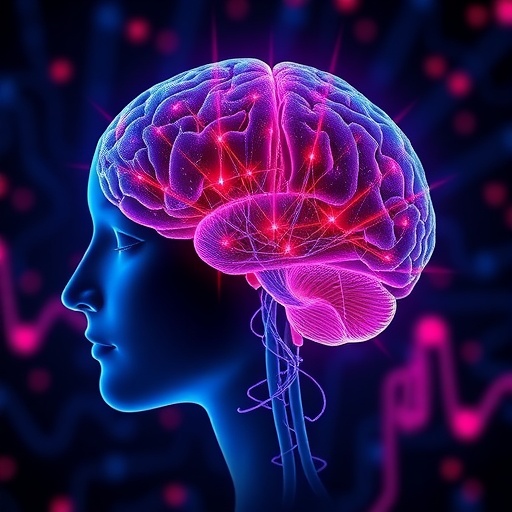In a groundbreaking study published in BMC Psychiatry, researchers have unveiled intricate connections between autonomic nervous system (ANS) regulation and emotional processing during cognitive reappraisal in individuals with major depressive disorder (MDD). This research illuminates how alterations in peripheral physiological signals correlate with brain activity, providing new insights into the mechanisms underlying emotion regulation deficits in depression.
Cognitive reappraisal, a sophisticated form of emotion regulation, involves changing one’s interpretation of a situation to alter its emotional impact. It relies heavily on neural circuits encompassing prefrontal cortical regions, which orchestrate control over limbic areas implicated in mood and affect. Although previous studies have explored the neural substrates of cognitive reappraisal, the current investigation uniquely integrates real-time functional magnetic resonance imaging (fMRI) with measurements of autonomic function, advancing understanding of the dynamic brain-body interplay in MDD.
One particularly novel aspect of this research is the focus on the intermediate frequency band (IM; 0.12–0.18 Hz) of heart rate variability (HRV) and respiratory signals, hypothesized to reflect relaxation and emotional processing states. By employing neurofeedback-guided cognitive reappraisal tasks while monitoring these physiological measures, the team was able to precisely delineate how brain activation patterns corresponding to emotion regulation co-vary with peripheral autonomic indicators.
The study utilized a rigorous general linear model approach to extract brain activations associated with cognitive reappraisal, alongside fluctuations in HRV and respiratory IM bands. Regions of interest (ROIs) were defined based on emotion regulation-related brain areas, allowing for targeted investigation into the coupling between neural and physiological signals. This methodological framework not only quantified brain-periphery coupling during emotion regulation but also permitted comparison between MDD patients and healthy controls.
Remarkably, the results demonstrated that both MDD patients and healthy participants exhibited predictive relationships between brain activity and IM band fluctuations during cognitive reappraisal. However, the nature of this coupling diverged significantly between the two groups. Specifically, MDD patients showed altered synchronization between prefrontal regulatory regions and ANS signals, suggesting disrupted integration of central and peripheral processes that are vital for adaptive emotion regulation.
Further analysis revealed that coupling changes over successive neurofeedback training sessions were exclusive to MDD patients, indicating a potential plasticity or susceptibility in autonomic-brain communication pathways within this population. This finding underscores the possibility that neurofeedback interventions targeting ANS modulation could hold therapeutic promise by restoring effective brain-body regulatory networks.
Beyond enhancing scientific understanding, the identification of this altered coupling in MDD provides avenues for developing novel biomarkers for depressive states. Peripheral physiological indicators, such as HRV in specific frequency bands, may serve as non-invasive proxies for monitoring treatment progression and real-time psychological state assessment, thereby improving clinical care.
The intricate dance observed between brain circuits and autonomic function during cognitive reappraisal illustrates the deeply embodied nature of emotion regulation. In MDD, this embodiment appears to be compromised, reflecting fundamental disruptions that may perpetuate impaired mood regulation and associated symptoms. Targeting these disruptions could pave the way for interventions that more holistically address both brain and body aspects of depression.
The study’s innovative integration of neuroimaging and autonomic measurements through neurofeedback exemplifies the cutting edge in psychiatric research methodologies. This multimodal approach facilitates a deeper mechanistic understanding that transcends purely cerebral models of emotional dysfunction, highlighting the necessity of incorporating physiological dimensions in mental health research.
Importantly, these findings call for a reconsideration of traditional treatments for MDD, encouraging the inclusion of strategies that directly engage autonomic function alongside cognitive and pharmacological approaches. Mindfulness-based therapies, biofeedback, and neurofeedback might be especially efficacious in targeting the altered brain-body coupling central to depressive pathology.
The implications of this research extend widely, potentially informing future studies exploring the interplay between the autonomic nervous system and brain function across other psychiatric and neurological disorders characterized by emotion regulation deficits, such as anxiety, PTSD, and bipolar disorder. Understanding shared and distinct patterns of dysregulation could refine diagnostic and therapeutic precision.
In sum, this pioneering investigation by Li et al. significantly advances our comprehension of how autonomic and neural systems coalesce during emotional regulation in depression. It opens promising directions for both basic and clinical neuroscience, aiming ultimately to alleviate the pervasive emotional suffering characteristic of major depressive disorder through innovative, integrated treatment modalities.
Subject of Research: Autonomic nervous system regulation and neural correlates during cognitive reappraisal in major depressive disorder.
Article Title: Autonomic regulation during cognitive reappraisal in major depressive disorder: a study of fMRI correlates.
Article References:
Li, Y., Keller, M., Zweerings, J. et al. Autonomic regulation during cognitive reappraisal in major depressive disorder: a study of fMRI correlates. BMC Psychiatry 25, 1053 (2025). https://doi.org/10.1186/s12888-025-07495-8
Image Credits: AI Generated
DOI: 04 November 2025




